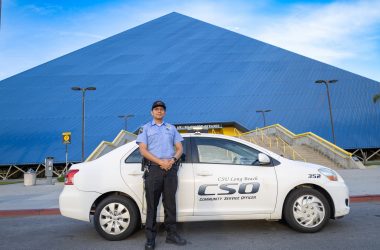Elena Encarnacion, a Cal State Long Beach journalism alumna, would have already seen her commencement through in 2006 if it hadn’t been for an unscheduled deferment six weeks prior to her intended graduation.
Before the end of her last semester in 2006, Encarnacion said she wanted to “accomplish something she could be proud of.” She worked on a feature story investigating drug addiction for DIG Magazine. While researching, the subjects became her friends, and the story became her lifestyle. She had developed a crack cocaine addiction.
“I thought the best way to do that would be an ethnographic approach,” said Encarnacion, who graduated this spring at 35 years old. “I’m going to go to Long Beach, check into a crack motel and write about the people who live there. I did that, and I literally got sucked into their world.”
Journalism professor Barbara Kingsley-Wilson, who was her professor at the time, brought in a colleague from the Orange County Register, to follow Encarnacion to the scene and offer guidance for journalists to handle dangerous circumstances.
Although she faced resistance from the higher-ups, such as the journalism department chair, Encarnacion pursued the story that she said eventually costed her eight years of her life.
“The chair at that time wanted to stop me from doing the story because he said it was too dangerous,” Encarnacion said. “He was telling [DIG Magazine that they] couldn’t publish it and … it was an issue. It was like a little scandal.”
Her venture into covering the crack community was even featured as a test question on the final exam of the department chair’s ethics class, where they had to “read [the article] and talk about different ethical issues,” Encarnacion said.
“I was semi-living on the streets … trying to write about their lives and trying to help them,” Encarnacion said. “I had six weeks left to go for graduation, and I just threw it all away. It’s insanity. And a year later I was a crack head.”
Encarnacion said she financially supported her addiction through disability checks and an airline job. She also said she siphoned money from insurance scams and from a former significant other she had been involved with.
Their relationship had been a critical motive for Encarnacion’s first steps into a drug-addicted life as well as her final steps out, she said. She had first met him in the crack motel while researching her story.
It wasn’t long until Encarnacion shared an apartment with him as well as the next five years of her life.
“Eventually the relationship was very violent,” she said. “I was overdosing. I was afraid that I was going to die.”
Encarnacion knew leaving him behind would mean leaving behind the toxic habits she had acquired along the way as well. But the little she had — her apartment, her job, the addiction and her significant other — seemed even more obsolete after leaving.
Depending on the day, Encarnacion would sleep in her car, a motel room or a jail cell if the harassment from law enforcement authorities proved successful, she said.
Out of desperation, she reached for a piece of cardboard and wrote “my dog is hungry” on it, she said.
Encarnacion said she would commute up to three and a half hours by public transportation to beg in well-off cities such as Laguna Niguel. Food stamps and public services provided by local churches gave her enough food to get by. She said that anonymous 12-step programs helped keep her clean from old habits.
Orange County Mental Health, which is a program free of charge, helped her find a psychotherapist to help her mentally adjust back into society.
Encarnacion said that they “literally had an agenda written out” to return her to her life before her addiction.
It wasn’t until Encarnacion‘s friend, a woman she had met through panhandling, suggested contacting the California Department of Rehabilitation, that Encarnacion thought about returning to school.
“I went, I applied and the counselor asked me my story so I told her and she said, ‘Well why don’t you go finish? You only have one semester,’” Encarnacion said.
A year and a half later, she returned to the journalism department at Cal State Long Beach, and was still remembered by the staff as the “girl who wrote that story.”
“I [thought] they’d never let me,” Encarnacion said as she recalled her doubts of returning to CSULB and completing her degree.
Soon, ideals of public defense, human rights and protecting the underrepresented will come full circle for Encarnacion as she now interns at the Tokyo Journal and plans to continue her education at Pepperdine University to pursue law.



